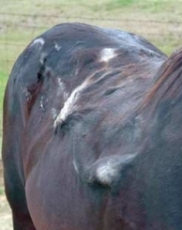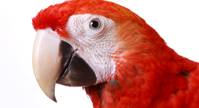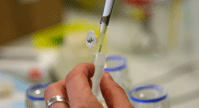Hereditary Equine Regional Dermal Asthenia (HERDA)
Description:
 Also known as Hyperelastosis Cutis, HC is a genetic skin disease predominantly found in the American Quarter Horse. Researchers at Mississippi State University and Cornell University believe that the origin of this genetic disorder may be the Poco Bueno's sire line. The symptom of this disorder is a lack of adhesion within the layers of skin due to a genetic defect in the collagen that holds the skin in place. This defect causes the outer layer of skin to split or separate from the deeper layers, sometimes tearing off completely. Areas under the saddle seem to be most prone to these lesions, often leaving permanent scars and preventing the horse from being ridden.
Also known as Hyperelastosis Cutis, HC is a genetic skin disease predominantly found in the American Quarter Horse. Researchers at Mississippi State University and Cornell University believe that the origin of this genetic disorder may be the Poco Bueno's sire line. The symptom of this disorder is a lack of adhesion within the layers of skin due to a genetic defect in the collagen that holds the skin in place. This defect causes the outer layer of skin to split or separate from the deeper layers, sometimes tearing off completely. Areas under the saddle seem to be most prone to these lesions, often leaving permanent scars and preventing the horse from being ridden.
The disorder is recessive, which means that a horse must be homozygous positive or have two copies of the defective gene to suffer from the disease. Consequently, both the sire and the dam must possess at least one copy of the mutated gene in order for the offspring to be afflicted. Offspring born with one copy of the defective gene and one non-defective copy are considered a carrier and have a 50% chance of passing the defective gene on.
Although there is no cure for the disorder, Animal Genetics has developed a simple DNA test to detect a single nucleotide polymorphism (SNP) mutation with a high degree of association to this disorder.
Breeds Affected:
Quarter Horse, any horse with quarter horse blood.
Additional Tests For Quarter Horses:
Polysaccharide Storage Myopathy (PSSM)
Hyperkalemic Periodic Paralysis Disease (HYPP)
Glycogen Branching Enzyme Deficiency (GBED)
Combination 5 panel (PSSM, MH, HYPP, HERDA, GBED) $95.00
Test Results:
Animal Genetics offers DNA testing for Hereditary Equine Regional Dermal Asthenia (HERDA). The genetic test verifies the presence of the recessive HERDA gene and presents results as one of the following:
| Hrd/Hrd | Affected | The horse carries two copies of the HERDA mutation and is homozygous for HERDA. The horse is affected with the HERDA genetic disorder. |
| Hrd/n | Carrier | Both the normal and mutant copies of the gene detected. Horse is a carrier for the HERDA mutation and can pass on a copy of the defective gene to its offspring 50% 0f the time. |
| n/n | Negative | Horse tested negative for the gene mutation that causes HERDA and will not pass on the defective gene to its offspring. |
References:
Genomics. 2007 Jul;90(1):93-102. Epub 2007 May 11. Homozygosity mapping approach identifies a missense mutation in equine cyclophilin B (PPIB) associated with HERDA in the American Quarter Horse. Tryon RC, White SD, Bannasch DL.
Submit a Sample for Testing:
To submit a sample for testing please click on ORDER and download a sample submission form. Then follow the sample collection and submission instructions.
Cost per sample is $35.00. Please see our fee schedules below for combination rates.










